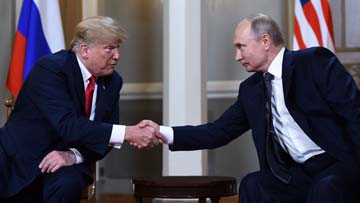
Was Donald Trump, the American president, made by Russia?
“The Russian government interfered in the 2016 presidential election in sweeping and systematic fashion,” declares the two-volume 448-page report by Special Counsel Robert Mueller III, entitled “Report On The Investigation Into Russian Interference In The 2016 Presidential Election” and made public on April 18, 2019, with redactions or erasures.
According to Wikipedia, the Russian government interfered in the 2016 US presidential election to harm the campaign of Hillary Clinton, boost the candidacy of Donald Trump, and sow political discord in the United States.
Russian President Vladimir Putin personally directed the operation. He didn’t like Clinton whom the Russians suspected, when she was President Obama’s secretary of state, to be behind the 2011-2012 mass protests in Russia against Putin’s rule. Also, with Clinton in the White House, the Kremlin believed it would be almost impossible to lift US sanctions against Russia following Russian military intervention in Ukraine in February 2014. Finally, Trump wanted to put up a tower in Moscow.
Whether thanks to Russian interference and/or the gullibility of American voters, Trump was elected the 45th president of the world’s most powerful nation on Nov. 8, 2016, despite losing the popular vote by three million votes or by 2.1%, to Clinton. Trump won the electoral college vote, 304 to Clinton’s 227.
Clinton’s electoral college loss came mainly from her losing the electoral college votes of three former Democratic strongholds – Michigan, Wisconsin, and Pennsylvania, by just 40,000 votes. Said political analyst David Axelrod, “the Russians targeted voters in swing states.”
US intelligence agencies concluded on Jan. 6, 2017, that the Russian government had interfered in the elections in order to “undermine public faith in the US democratic process, denigrate Secretary Clinton, and harm her electability and potential presidency”.
The Special Counsel Mueller’s Office determined that Russia’s two principal interference operations in the 2016 US presidential election—the social media campaign andthe hacking-and-dumping operations—violated US criminal law.
Mueller has charged many of the individuals and entities for “conspiracy to defraud the United States by undermining through deceptive acts the work of federal agencies charged with regulating foreign influence in US elections, as well as related counts of identity theft.”
Separately, Russian intelligence officers who carried out the hacking into Democratic Party computers and the personal email accounts of individuals affiliated with the Clinton Campaign conspired to violate, among other federal laws, the federal computer-intrusion statute, and they have been so charged.
The Special Counsel investigation, which concluded in March 2019, resulted in indictments of 26 Russian citizens and three Russian organizations.
In US v. Viktor Borisovich Netyksho, a federal grand jury in the District of Columbia returned an indictment on July 13, 2018, against 12 Russian nationals for their alleged roles in computer hacking conspiracies aimed at interfering in the 2016 US elections. The indictment charges 11 of the defendants with conspiracy to commit computer crimes, eight counts of aggravated identity theft, and conspiracy to launder money. Two defendants are charged with a separate conspiracy to commit computer crimes.
In US v. Internet Research Agency, a federal grand jury in the District of Columbia returned an indictment on Feb. 16, 2018, against 13 Russian nationals and three Russian entities accused of violating US criminal laws in order to interfere with US elections and political processes. The indictment charges all of the defendants with conspiracy to defraud the United States, three defendants with conspiracy to commit wire fraud and bank fraud, and five defendants with aggravated identity theft.
In US v. Konstantin Kilimnik , a federal grand jury in the District of Columbia returned a third superseding indictment on June 8, 2018, against Konstantin Kilimnik, of Moscow, Russia. Kilimnik is charged with conspiracy to obstruct justice and obstruction of justice by attempting to tamper with a witness on behalf of Manafort.
Kilimnik has ties with Paul Manafort, the campaign chairman for Trump and is now a convicted felon.
Kilimnik is believed by CNN and The New York Times to be “Person A” listed in court documents filed by the Special Counsel against Manafort, which allege that Person A has ties to Russian intelligence agencies, or is a Russian intelligence operative. He is also believed to be Person A in court documents filed in the criminal indictment of Alex van der Zwaan. In 2017 Kilimnik denied any such intelligence ties.
Says the Mueller Report:
“Evidence of Russian government operations began to surface in mid-2016. In June, the Democratic National Committee and its cyber response team publicly announced that Russian hackers had compromised its computer network. Releases of hacked materials-hacks that public reporting soon attributed to the Russian government-began that same month. Additional releases followed in July through the organization WikiLeaks, with further releases in October and November.”
“In late July 2016, soon after WikiLeaks’s first release of stolen documents, a foreign government contacted the FBI about a May 2016 encounter with Trump Campaign foreign policy advisor George Papadopoulos. Papadopoulos had suggested to a representative of that foreign government that the Trump Campaign had received indications from the Russian governmentthat it could assist the Campaign through the anonymous release of information damaging to Democratic presidential candidate Hillary Clinton. That information prompted the FBI on July 31, 2016, to open an investigation into whether individuals associated with the Trump Campaign were coordinating with the Russian government in its interference activities.”
“That fall, two federal agencies jointly announced that the Russian government “directed recent compromises of e-mails from US persons and institutions, including US political organizations,” and, “[t]hese thefts and disclosures are intended to interfere with the US election process.” After the election, in late December 2016, the United States imposed sanctions on Russia for having interfered in the election. By early 2017,several congressional committees were examining Russia’s interference in the election.”
Despite the Russian interference, Mueller concluded there was no collusion between the Trump Campaign and Russia. Besides, “collusion” is not a crime under American law.
— Tony Lopez
